Newsletter May 2022
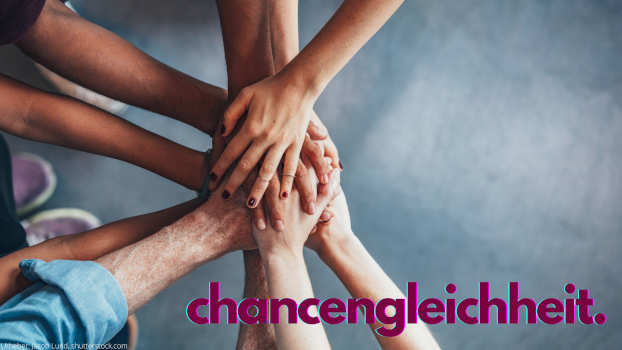
|
||||||||||||||||||||||||||||
|
Falls die E-Mail nicht korrekt angezeigt wird, wechseln Sie bitte zur Webseite |
||||||||||||||||||||||||||||
|
Who is... |
|
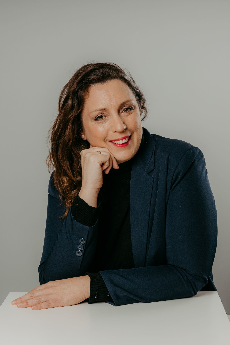
|
... the equal opportunities officer?
Dr. Mareike Fingerhut-Säck is the deputy central equal opportunities officer at the OVGU and a candidate for the 2022 election of the equal opportunities officer. We asked her how she imagines the future of equal opportunities at the OVGU. Why do you want to become an Equal Opportunities Officer? Equal opportunities for everyone are very important to me! For me, it means that everyone should be able to pursue the same career, regardless of their gender. And I want to be part of that. I would like to contribute to the OVGU supporting young scientists even more, especially female postdocs. As a gender researcher, I also believe that we need to push the connection between gender research and equality even further. I'm also a historian and I think that this knowledge gives me a special understanding of how the barriers for marginalized genders came about in the first place and what we can do together to break down these barriers. I would also like the university location to become more attractive for students again. What would be one of the first measures you would like to implement? Student advertising is a very big topic for me. I want to show that we are colourful; a university for everyone. We also have to involve the students and together advance equality and equal opportunities at the OVGU. In concrete terms, I would also like to reactivate the Gender Campus in this context and, of course: further establish gender research. This is vey important to me. What do you say to critics who claim that we don't need an equal opportunities officer, we are equal after all? I always refer to the gender pay gap. In 2022, women will still earn much less than men for the same work. This shows very well how unequal we actually are. In addition, the discrimination experiences of women and marginalized genders are considerable and there simply has to be someone that advocates for these groups. This is important at every university and in every company. What do you do when you are not working as deputy decentralized equal opportunities officer? Working in these fields, you always fight for equality. In addition to my work at the chair for modern history with a focus on gender research, I am primarily a mother and have a young son. I also love traveling with my husband. This not only broadens the horizon but also helps in gender equality work: You have to adjust to things and learn to be tolerant.
|
This is not what a feminist looks like! |
|
|
GNTM: a catwalk full of horrors
For years now, the TV show Germany`s Next Topmodel with Heidi Klum has been critized by feminists. A few days ago, shortly before the finale of the 17th season, Youtuber Rezo, known for his video "The Destruction of the CDU" from 2019, took on the format. In the video titled „GNTM Exposed: Abuse, lies and minors“, the 29-year-old points out the sexualization of underage girls and the stress caused by the production company to enforce conflicts among the candidates. He also takes up the allegations of former candidates who accuse Heidi Klum and the jury of severe manipulation of minors. The video can be found here. However, these allegations are not new. Numerous magazines and media outlets, from Missy Magazine to Spiegel, have been criticizing the show for years; for sexism, for the tokenization of trans people and BIPoc, body shaming and fake of body positivity. Meanwhile, Heidi Klum adressed these allegations in the final episode last week, but not as expected: "Dear critics, unfortunately I have to disappoint you, we're going to continue as before". Instead of talking about the allegations, she created a false narrative of people criticizing the diverse body types shown in this season of GNTM. That is not what a feminist looks like. |
|
News in gender research |
|
|
Gender and linguistics
In an interview with Uta C. Schmidt from the blog interdisciplinary gender research, the linguist Miriam Lind not only briefly and concisely explains what gender-inclusive language is all about. She also lets us share in insights that historical German linguistics has in store for current discussions about generic masculine nouns and the relationship between grammatical and social gender. More on gender-sensitive language can also be found in this issue in the category Dear Dorothea. |
|
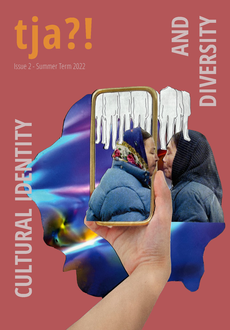
|
tja?!-Magazine: New issue on cultural identity and diversity
The student magazine, tja?! wants to create awareness for topics related to gender research. After the first special issue on gender, the second issue is now available, on cultural identity and diversity. Regarding the content, the editor informs: "With the start of the new year, the more or less well-survived exam phase and the start of the new semester, there is always a hopeful feeling of a small restart. The corona measures are not as strict as they were now - maybe we have survived the worst. At the same time, however, others world events are overshadowing this sense of optimism: The Olympic Winter Games in China are accompanied by the fiction of the IOC's “political neutrality.” The war in Ukraine brings back memories of the Cold War and brings war and suffering back into the reality of Europe. You can read why sport is always political and how it is exploited by politics in Paula's article "Schwarz-Rot-Gold" on page 24. Naomi and Lara have dealt with the question of how the German past still has a major influence on the formation of identity for many people today and what constitutes East German identity. In her commentary on page 7, Rabia illustrates how experiences of racism affect and shape one's own identity. Rabia has also taken a critical look at representation and diversity in publishing and offers a behind-the-scenes look. You can find this article starting on page 28." More information about the magazine and the first issue can be found here. You can also find tja?! on Instagram. |
|
Gender Equality in Academia and Research (GEAR): a tool for implementing gender equality plans
Gender equality plans are now an integral part of numerous fundings. The Gender Equality in Academie and Research (GEAR) tool has been offering orientation and advice on gender equality work in the areas of research and innovation since 2015. With the new requirements concerning the EU program Horizon Europe and the associated fundings for research and innovation, the GEAR tool has been updated and is now aligned with the new guidelines. What is GEAR? GEAR is a tool that provides guidance and information on how to implement a GEP (Gender Equality Plan) in an organization to promote structural and cultural change towards gender equality. It is divided into different sections. Further information on application, implementation and target group can be found here |
|
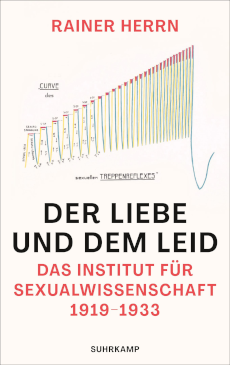
|
A new book on Hirschfeld's Institute for Sexology will be published in summer 2022
At the end of June 2022, Rainer Herr’s new book “Der Liebe und dem Leid. Das Institut für Sexualwissenschaft 1919-1933” will be published by Suhrkamp Verlag. Content: When Magnus Hirschfeld opened his institute in Berlin's Tiergarten in 1919, the future seemed to belong to the young discipline of sexology. The extensive library, the available collections, counseling and therapy offers attracted patients and visitors from all over the world. People of all walks of life were able to find out about contraception or protection against sexually transmitted diseases on site. For a long time, however, the institute was to remain the only institution with the aim of treating the subject of sexuality in its entirety. Hirschfeld and his staff were always exposed to hostilities from political and scientific opponents, which resulted in the looting of the institute by nazis and its closure in 1933. Scheduled release: June 13, 2022 Additional information about the book can be found here. |
University and politics |
|

|
Survey: Visibility of female scientists
The visibility of women and marginalized genders in science is still a contested field. According to Statista, there were more than 36,000 full-time professors at German universities in 2020; genders outside of the binary gender system were not included in this survey. With almost 12,500 female professors, the proportion of women is around one third. This is where the Spark project comes in. The acronym stands for "visible high potentials as role models for scientific female careers". Spark wants to investigate the visibility of women in science and develop a scientifically workshop format to support female scientists at different career stages in gaining more visibility for themselves. For the scientists involved in the pilot workshop, this goal of increased visibility should already be achieved during the project period. At the moment, the Spark team is in the process of collecting existing experiences and needs. Researchers still have until June 16 to name factors that they believe impair or promote their visibility. The information remains anonymous. Click here for the survey: https://www.soscisurvey.de/spark-survey/?wt_zmc=nl.int.zonaudev.112331552451_386520408117.nl_ref. Further information is available here. |
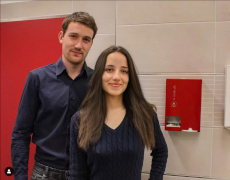
|
Start-Up Periodically: free period products for public toilets
Many public toilets still don’t offer free period products. Meanwhile, 86 percent of women surveyed in a study stated that they had their menstrual period unexpectedly at least once without having period products with them, 79 percent of these women improvised at least once by making a pad out of toilet paper or something else. Periodically, a start-up by Katharina Weißig and Corvin Groß, wants to change that. They offer dispensers for free period products. Initially an idea they had in mind while they were still studying, Periodically is a growing business now and was supported by the transfer and start-up center (TUGZ) at Otto-von-Guericke-Universität Magdeburg. You can find an interview with Katharina Weißig and Corvin Groß on the TUGZ website. More information about Periodically, which is supported by the Charité Berlin and the medical faculty of the University of Leipzig, can be found here or on Instagram. |
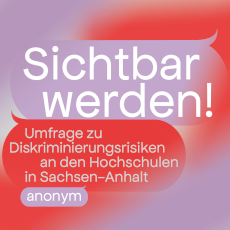
|
Survey: Discrimination at universities
In May, the online survey on the risks of discrimination at universities was launched on behalf of the universities of Anhalt, Harz, Magdeburg-Stendal, Merseburg, Burg Giebichenstein University of Art and Design Halle and Otto von Guericke University Magdeburg. In order to strengthen tolerance and future viability at the participating universities, the survey aims to uncover and eliminate gateways for experiences of discrimination. The initiators of the survey are employees of the project network FEM POWER of the state of Saxony-Anhalt. FEM POWER itself is a seven-year funding program of the ESF and the state of Saxony-Anhalt to create and promote equal opportunities for women and men in science and research. It is based at the local colleges and universities as well as the Leibniz institutes. You can find the survey in English and German here. Any member of one of the universities mentioned can take part in the survey via this link. If there are any technical problems you can write an email to evasys@hs-merseburg.de . The survey runs exclusively online and can be used with any internet-enabled device. Participation is possible up to and including June 17, 2022. Participation is voluntary. The universities only receive anonymous group-specific evaluations. |
Events |
|
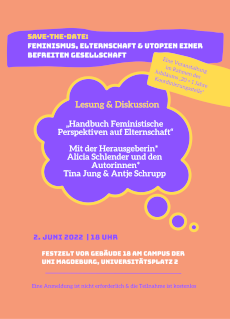
|
Reading „Handbuch Feministische Perspektiven auf Elternschaft“ I June 2, OVGU
The recently published Handbuch Feministische Perspektiven auf Elternschaft brings together 50 voices of feminism on previously marginalized topics in the German-speaking discourse, e.g. B. trans parenthood, accompanied parenthood or racism-critical perspectives on parenthood. Together with Alicia Schlender, one of the editors, and two authors of the book, the handbook will be presented and the questions of what parenthood has to do with feminism will be explored has to do and what feminist utopias of a good life with children and a liberated society can look like. The event is a cooperation with the KgKJH, the Volksbad Buckau, c/o Courage Women's Center, the Heinrich Böll Foundation Saxony-Anhalt and Dr.in Tina Jung, the Marianne Schminder guest professor for gender research at the University of Magdeburg. The reading takes place on the 2nd of june at 6pm at OVGU Campus, Universitätsplatz 2, on the occasion of the anniversary of the Koordinierungsstelle Genderforschung & Chancengleichheit Sachsen-Anhalt (KGC). |
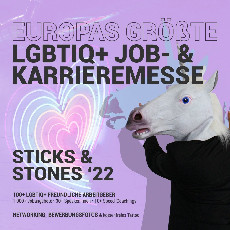
|
LGBTIQ+ Job and Career Fair STICKS & STONES (SXS) I June 11, Berlin
After 2 years of the pandemic, the 13th LGBTIQ+ job and career fair STICKS & STONES (SXS) will take place again offline in Berlin on June 11th. More than 120 companies and organizations present themselves at the fair. PAYBACK, Deutsche Bahn, BCG Platinion, Sony Music Entertainment, the federal Autobahn GmbH, the University Hospital Hamburg-Eppendorf, Henkel, BNP Paribas, Inditex, McKinsey & Company, EY, Pfizer, Accenture, Apple, Tesla, HUGO BOSS and many more. An overview of all exhibitors can be found here. On June 11, more than 30 speakers will be speaking on the stages on topics related to careers and jobs. There are also networking sessions, a free tattoo and application photos. Students can secure a free ticket here. |
|
Seminar: Body, Diversity, Divergence - Conceptual Design Methods I August 23-24, Essen
The two-day training combines the topic of body diversity and body-related discrimination with conceptual design methods for (cultural) educational practice with adolescents and young adults. Both topics are closely intertwined and highly topical in young people's lives, especially when it comes to using social media. Bodyism and lookism describe the discrimination against people based on prevailing beauty and body norms. In the first part of the training, the focus will be on questions such as: What forms does body-related discrimination take? How are bodyisms and lookisms intertwined with other forms of discrimination such as racism? In addition, the participants reflect on their own handling of bodies through exercises and exchange. The second part of the training focuses on conceptual design methods in the field of photography and social media. After a basic introduction to conceptual design methods, the participants use concrete practical examples to develop ways of using them in their own cultural education work with adolescents and young adults. The training is implemented in cooperation with the LAG Kunst & Medien NRW. The LAG Kunst & Medien NRW e.V. is a state-wide sponsor of cultural youth work and, together with network partners, generates a wide range of offers for children and young people in the areas of photography, media design and visual and creative work. Dates: August 23-24 Location: Limbecker Platz 7, 45127 Essen Cost: 150 euros until June 28th, after that 170 euros. Speakers: Day 1: Sarah Navarro | FUMA Gender & Diversity NRW Day 2: Jara Reker | LAG Art & Media NRW |
|
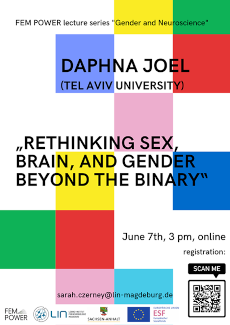
|
Discussion: Rethinking sex, brain, and gender beyond the binary I 7. Juni, ONLINE
On June 7, at 3 p.m., Daphna Joel will speak about “Rethinking sex, brain, and gender beyond the binary” as part of the Gender and Neuroscience lecture series. Daphna Joel is a professor in the School of Psychological Sciences and Sagol School of Neuroscience at Tel Aviv University. The lecture will be in English, but there will be an opportunity to ask questions in German, which will then be translated. More information about Daphna Joel and her scientific work can be found here. Prior registration by email is requested: sarah.czerney@lin-magdeburg.de . |
|
|
Lunch Talk: Feminism - relationship - delimitation: The social debate on sex tourism and the marriage trade in Germany around 1970-1990 I June 16, ONLINE
The Gender Lunch Talks at the Margherita von Bretano Center at Freie Universität Berlin want to make gender research at the FU visible and promote networking between researchers. The next event: Thursday, June 16, 2022, 12:30 p.m. - 1:30 p.m. (online) Jun.-Prof. dr Ulrike Schaper (Friedrich-Meinecke-Institut): Feminism - Relationship - Delimitation: The social debate about sex tourism and the marriage trade in the Federal Republic of Germany, ca. 1970-1995. Participation at: https://fu-berlin.webex.com/fu-ber-lin/j.php?MTID=m0f1bf9505ade1701ed7436d0083ec79e Meeting number: 2733 116 8035 Password: M4DnjEpFP54 |
|
COST Seminar for future applicants I June 23, ONLINE
On June 23, 2022, the German Coordination Office for COST will hold an online seminar on how to apply for COST from 9:30 a.m. to 2:30 p.m. The seminar is aimed in particular at researchers who plan to submit an application for the next deadline on October 20, 2022. In addition, all multipliers are welcome. The aim of the event is to prepare applicants as well as possible in terms of content and form for submitting an application in COST. The participants receive information about COST in general and about submitting an application in COST. There is also an opportunity to answer questions about COST and the application process. The event will be rounded off by a field report on an ongoing COST action. The event will be conducted online using Webex. This requires a speaker, a microphone or a headset, ideally also a camera. You can register here, further information is available here. |
|
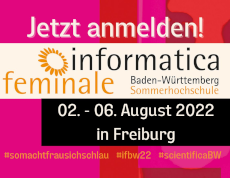
|
Summer school: informatica feminale Baden-Württemberg I 2.-6. August, Freiburg
The informatica feminale Baden-Württemberg is a summer school for female students and women working in the field of computer science and related disciplines. It will take place from Tuesday, August 2nd to Saturday, August 6th, 2022 at the technical faculty of the University of Freiburg. Registration and the course overview are available here. The registration ends on tuesday, June 21, 2022. The main topic this time is "IT and sustainability". Numerous courses, workshops and lectures will be offered, e.g. on data science, Python, web development, game development, building pet robots, data protection, IT security, agile product/project management, design thinking and many more. For many courses, female students can receive credit points according to ECTS and professionals can apply for training time. There is also a program with a city tour and archery and many opportunities for networking. There will also be a Career Day again, with lectures, workshops and individual coaching as well as a doctoral session for which lectures can still be submitted (by email to informatica@hs-furtwangen.de). The keynote entitled "Dark Data - The Unknown Factor" will be presented by Ms. Anne Andrees from Mercedes-Benz Tech Innovation. The participation fee for students is 40 euros per half-week course, for professionals 240 euros per half-week course. Additional information is available here. |
|
Movie + discussion: Les Enfants Terribles / Yaramaz Çocuklar I June 10, Halle
In Ahmet Necdet Çupur's film, the enfants terribles are his siblings. They all want to break out of the life their parents prepared for them, just like he did. Mahmut is barely a grown man when his marriage to a much too young bride, Nezahat, is already threatening to fail. Fiery Zeynep is determined not to marry under any circumstances. Instead, she will do anything to study. The parents fight for their authority and wonder what is happening to the world around them. Les Enfants Terribles is a timeless epic wrapped in domestic drama. Zeynep and Mahmut wage their war of independence with determination and strategy, in a game of attack and retreat, never forgetting their main goal: being able to choose their own path. Ahmet Necdet Çupur captures these heroic struggles and the most subtle emotions of his characters with care and respect. Les Enfants Terribles is a delicately staged, memorable family drama in which parts of Turkish society and their processes of change are reflected. France, Germany, Turkey | 2021 | 92 mins German premiere Languages : Turkish, Arabic Subtitles: German After the film, the focus is on family and women's politics in Turkey, (gender) norms and role models. Discussing: Ahmet Necdet Çupur - Director of the film Yonca Verdioğlu - Heinrich Böll Foundation Istanbul Leyla Soydinç - Mor Çatı Women's Shelter Foundation, Istanbul Place: Zazie cinema & bar (Kleine Ulrichstr. 22), Halle (Saale) Date: June 10, 6 p.m The event will be held in Turkish with German translation. In cooperation with the state foundations of Hesse, Hamburg, Bavaria and Baden-Württemberg of the Heinrich Böll Foundation and the regional office in Istanbul. |
|
|
Seminar: Empowerment for Women who experience racism (BIWoC) I June 11, Magdeburg
Racism affects all areas of everyday life and comes in many forms. Black people and people of color are affected in different ways and intensities on a daily basis. Therefore, it is important to find ways to strengthen yourself for such situations. This is where the workshop starts. Through mutual exchange and using selected methods, the following questions are dealt with: How does racism work? What does racism do to me? What do we mean by empowerment? How can we live constructively in this society? How can I pursue my goals despite these experiences? How can we support each other? What role does community play? In this workshop for BIWoC (Black, Indigenous and Women of Color - including all who identify as women) a space of self-care and goodwill with oneself and for one another will be created together. This room offers the opportunity for exchange and reflection to talk about experiences of racism and possible strategies for action. In order to enable a more protected framework, this workshop is aimed exclusively at people who have their own experiences of racism in their everyday lives. A registration is only binding after receipt of a written confirmation of registration. This seminar is compatible with the Green Campus Political Management Certificate (7 units). Organization: Heinrich Böll State Foundation of Saxony-Anhalt When & Where: June 11, Magdeburg Language: German Participation fees: €15, reduced €10 Trainer: Victoria - co-founder of BIPoC initiative (un)Visible - East Germany/GDR born and socialized black cis woman (she/her), mother, abled bodied, privileged in terms of education (academic) and language, for example. Among other things, she works as a freelance trainer in political education with a focus on criticism of racism and empowerment. She speaks German & English. |
|
|
Discussion: The end of Roe v. Wade in the US: When women are deprived of the right to make decisions about their own bodies I June 13, ONLINE
At the beginning of May, the US media surprisingly published conservative judge Samuel Alito's draft verdict, according to which a majority on the Supreme Court wants to reverse the legalization of abortions. This step represents a historic turning point: For the first time in American history, the Supreme Court is taking back fundamental rights that have been guaranteed. Women are losing the right to self-determination over their bodies and it is already becoming obvious that aborting a pregnancy will be punished draconically in many conservative individual states in the future. The consequences are far-reaching and dramatic, but the decision seems to have taken the Democrats unprepared: So far, they have failed to prevent abortion from being criminalized. How did it come to this? What does this decision mean specifically for people in the US who are unintentionally pregnant? Ella Müller, head of the democracy program at the Heinrich Böll Foundation in Washington, will be talking about these developments . When: Monday, June 13, 2022, 4-5 p.m To register, click here. Moderator: Madeleine Hofmann, journalist and author Organization: Petra Kelly Foundation Questions to Ella Müller can be sent in advance by e-mail to dietz@petra-kelly-stiftung.de with the subject "Question for Ella Müller". |
|
Grants and prizes |
|
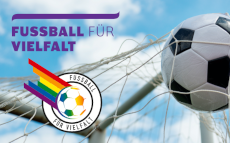
|
Magnus Hirschfeld Foundation offers 12.000 Euro for conference focussing on football and diversity
As part of its 2022 annual program "Stadiums in Rainbow Colors", the Federal Magnus Hirschfeld Foundation is awarding up to four German universities €12,000 each for the design and implementation of a specialist conference on the topic of "Fußball für Vielfalt". There are many debates about homophobia and queer hostility in (professional) football: they range from criticism of venues, critical reflection on fan culture or confrontations with heteronormative body cults to the question of a professional Bundesliga player not coming out in public. At the same time, the organized structures of football such as the DFB, DFL and DFL Foundation strive to adopt a diversity-friendly attitude and support campaigns and educational projects as well as the symbolic lighting of stadiums in rainbow colors. What role can such symbolic actions and the promotion of queer fan culture play? To what extent is the concept of "hostility" and normativity an inherent part of football and which old and new images of men are conveyed? At the same time, women's football can and should also become a focus for research: is there an oasis of “women's football”? How diversity-friendly is "women's football"? Additionally, the foundation also takes in consideration supposedly marginal issues such as the phenomenon of WAGs or the sexist culture surrounding professional football. Further questions are: what does football actually mean for the queer community? How does homophobia possibly differ from forms of enmity towards trans* or intersex people in football? For the application, a conference concept and a financing plan need to be submitted by Monday, June 13, 2022, by email to gesa.teichert@mh-stiftung.de or by post to the Magnus Hirschfeld Federal Foundation, keyword: Conference Fußball für Vielfalt 2022, Mohrenstr. 34, 10117 Berlin. Contributions from all fields and disciplines are welcome, from sports and sports journalism to gender studies, political science and sociology. The conference needs to take place in 2022, internal funds are not needed. Individual scientists, research groups, institutes or departments of German universities can apply. A conference concept that in addition to scientific expertise also provides networking with local football players and thus promotes theory-practice transfer is particularly welcome. This call is also aimed in particular at young scientists who are doing research in the field and want to share and discuss their thoughts and findings with others at a conference. The funds will be allocated by the end of June 2022. Contact: Referat Gesellschaft, Teilhabe und Antidiskriminierung Dr. Gesa C. Teichert-Akkermann Bundesstiftung Magnus Hirschfeld (BMH) Mohrenstr. 34, 10117 Berlin Tel.: 030 208 987 65-4 |
|
Gerda Henkel Foundation: funding for projects focussing on flight
With a new funding for projects focussing on "Flight" the Gerda Henkel Foundation would like to support internationally oriented projects in up to five research fields. The possible research fields are:
The funding is aimed at researchers worldwide. No institutional connection is necessary. Applications can be made until June 15, 2022. Further information is available here. |
|
Call for Papers |
|
|
Call for Abstracts: Teaching Gender in STEM during the pandemic
Content: The progressive digital transformation (Schrape 2021) has picked up speed again with the SARS-CoV-2 / COVID-19 corona pandemic since the summer semester 2020, but not only at universities worldwide (Hofmann et al. 2021; Klös 2020 ). Digitalization seems to continue unabated (Kreulich et al. 2021; Dittler/Kreidl 2021) and harbors a variety of challenges and change processes for different academic disciplines (Getto/Kerres 2017; Maasen/Passoth 2020; Schrape 2021). The fact that the effects of digitalization have on university teaching for different disciplines is as trivial as it is central and is reflected in the numerous activities of universities and university organizations (cf. Hassan 2017; Barton/Müller/Seel 2019; Hochschulforum Digitization 2021; storm/round nail 2021). New curricula, methods and adapted didactics as well as technologies (Gaebel et al. 2021) have also been attracting a variety of EdTech companies for years (Williamson 2021). In times of the pandemic, university teaching had to change ad hoc. The short-term switch to digital teaching challenged teachers and learners who previously had little contact with digital teaching. News about the worsening of social inequalities in the student body (Becker/Lörz 2020), about dropping out or about young people who do not even start studying in this situation (Lörz et al. 2020) characterize the debates (cf. Klös 2020) . At the same time, the university organization is also significantly affected by the pandemic, as those responsible were called upon from the outset to maintain teaching operations under completely changed conditions and to motivate their employees to teach high quality in a digital teaching and learning world. Topics such as the accessibility of online teaching, access to digital devices and increasing the willingness to work digitally were initially often ignored and only later became virulent, as did the establishment and further development of didactic knowledge of digital teaching and learning by lecturers (Kreulich et al 2021). Particular attention is paid to gender in teaching (cf. Winheller/Wedl 2019). Based on these observations, the question arises as to whether and how the corona pandemic specifically affected and continues to affect the topic of gender in STEM university teaching (cf. Bath 2015; Mauss 2017; Probstmeyer/Döring 2017; Jeanrenaud i.E.). The anthology should therefore contain articles that, among other things, analyze aspects of the digital transformation of STEM university teaching during the Corona crisis and provide insights into the prerequisites, processes and consequences of dealing with the topic of gender in this context. Theoretical and conceptual treatises as well as empirical studies from a wide range of perspectives are welcomed, in particular comparative scientific and university research, educational sociology, university didactics and pedagogy from and with gender studies and beyond, which move in STEM fields. Requirements & Deadline Abstracts of no more than 500 words (in German, English or French) plus a short biography of the author(s) are requested to be submitted in the form of a single PDF file by July 15, 2022 at the latest to: yves.jeanrenaud@lmu.de. The invitation to submit the manuscript will be sent in August. A full contribution (length: maximum 50,000 characters including spaces, tables and graphics as well as literature) is requested by October. The anthology will be published by Springer VS in the Fachdidaktiken series. For further questions please contact: Yves Jeanrenaud (yves.jeanrenaud@lmu.de) |
|
|
Gender and Nation in East-Central Europe (ca. 1750-ca. 1950)
In our examination of nation and gender in East-Central Europe, we are particularly interested in how the historical reality of complex identities that could not be defined in simplistic national terms clashed with the equally historical process of the emergence and eventual dominance of nationalism and what that process looked like if we investigate it through the lens of gender. We aim to explore how the invention of national identities along largely (although not exclusively) ethnic lines in East-Central Europe has historically undermined many existing gender identities and/or forced into existence new gender identities. Conversely, we also hope to investigate how various gender identities contributed to, clashed with, and rejected the various concepts of nation. Our goal is to present to the English-language readers the historical East-Central Europe of messy, fluid, and complex identities that existed at the same time as East-Central European nationalists were attempting to draw clear borders between what they understood as nationalities. We invite contributions that examine a juncture of nation and gender from an intersectional, transnational, and/or comparative perspective. We want to depart from the framework of nations vs. minorities and explore how such aspects of human experience as ethnicity, language, race, religion, or region, to mention just a few, were a factor in how individuals and/or collectives self-identified, interacted with others, and were perceived. In short, we are particularly interested in the explorations of nation and gender, in which a relationship between these two categories results in identities that undermine the nationalist visions of uniform nations, regardless of what that uniformity may have implied at various points of history. All historical processes at the junction of nation and gender necessarily affected women, men, and non-binary persons. Thus when we think of gender, we think beyond “women’s history” and aim to explore how the construction and development of nations in East-Central Europe affected gender identities – both self-defined and externally imposed – of various populations and individuals who called East-Central Europe home. We welcome the examinations of such categories as masculinity, femininity, girlhood, boyhood, male, female, and of all non-binary and fluid gender categories that have always existed in East-Central Europe, just as they have always existed anywhere else. Timeframe: Because the categories of nation, nationality, and nationalism are so central to our inquiry, we invite contributions that cover any historical period between the late eighteenth century and the immediate post-World War II period (up to the 1950s). The starting point of this timeframe follows the interdisciplinary scholarly conclusions that nations are a modern invention and that in Europe specifically, nations as the dominant units of social, political, and cultural organization matured in the aftermath of the French Revolution. This position, represented by most (albeit not all) scholars of nationalism, is particularly relevant to the history of East-Central Europe, where a shift from more inclusive non-ethnic and politically oriented nationalisms to increasingly exclusive ethnic and culturally oriented nationalist ideologies took place over the course of the nineteenth and twentieth centuries. The end point of our timeframe marks the emergence of a new East-Central Europe: post-Holocaust, post-Porajmos, and post-resettlements East-Central Europe, in which the concept of nation especially gains new historical meanings that are different from anything East-Central Europe had experienced before and that, we would argue, requires a separate analysis. How we define East-Central Europe: Our temporal choice is also linked to our definition of East-Central Europe as the lands that overlap roughly with the territories of the nineteenth-century German and Austro-Hungarian Empires as well as the conventionally delineated European parts of the Russian Empire. By no means do we argue that those territories are what East-Central Europe is or should be. Our choice is practical rather than ideological since those three empires and their policies towards various populations within their borders were often an important component in the process of formulating nationalist ideologies in the region. Moreover, it is within the territories of these three empires where various dividing lines between Western, Central, and Eastern Europe (in addition to various dividing lines between Europe and Asia) usually run in the countless debates over whether those three separate Europes exist and if they do, what they are. Why “East-Central”: Finally, our choice of the category of East-Central Europe, as opposed to Eastern Europe, mirrors the geographical delineation and thematic focus of our project. While predominantly German-speaking lands of Europe have been variously categorized as Western, Central, and, less frequently, Eastern Europe, various dialects of the German language were indisputably a critical component of identities among peoples and individuals who, in turn, have been typically categorized as Central or Eastern Europeans but hardly ever as Western Europeans (e.g., those inhabiting historically Hungarian, Bohemian, Slovak, or Polish lands, to mention the most obvious cases). Because of the historical impact of the German, Austro-Hungarian, and Russian Empires on the shifting borders of Europe in general and the resulting significance of the dialects of the German language to identities evolving in the lands that have been variously defined as either Central or Eastern Europe, we have concluded that the term East-Central Europe is more historically inclusive than the term Eastern Europe would be. Proposal format: We invite scholars at all stages of their careers to submit book chapter proposals of up to 500 words to Marta Cieslak at mxcieslak@ualr.edu and Anna Muller at anmuller@umich.edu by June 15, 2022. While this book aims to explore the history of nation and gender in East-Central Europe, we encourage scholars representing various disciplines and methodologies to submit an abstract. Contact (announcement) Marta Cieslak: mxcieslak@ualr.edu Anna Muller: anmuller@umich.edu |
|
|
Power and Gender: Entanglements, Dislocations, Relationships - a transdisciplinary analysis
Annual conference of the NRW Women's and Gender Research Network at the University of Duisburg-Essen (Campus Essen) / Friday, November 4, 2022 How gender and power are interwoven and how power is acquired and exercised and under what conditions has been a central question for gender studies since its beginnings. Many fields have devoted themselves to the facets of power and gender from a historical, philosophical, media and legal perspective and have presented empirical studies and theoretical frameworks. The interconnectedness is evident in institutions, supporting groups, work and everyday organizations, wars and conflicts, the media or economic relations. The connection between power and gender has epistemic dimensions and becomes virulent in symbolic systems such as language, knowledge systems, representations, but also in material forms such as money, architecture or clothing. Questions of power and gender are particularly ideal when it comes to a transdisciplinary exchange, since women's and gender studies deal with these questions from a variety of perspectives. Therefore, scientists from all disciplines are invited to participate in the program of the event with a contribution. Abstracts A brief description for a 20-minute presentation is requested; 1 page max. Please send these descriptions until May 16, 2022 to: beate.kortendiek@netzwerk-fgf.nrw.de . Publication The contributions are designated to be published in the journal Netzwerk Frauen- und Genderforschung NRW (Issue No. 51). In addition, the organizers are happy to publish high-quality contributions on the blog interdisciplinary gender research, even independently of a presentation at the annual conference. Additional information can be found here. |
|
|
Gender and sexualized harassment, discrimination and violence in the university context
As part of a cooperation between the Open Gender Journal (Germany/Austria) and Debate Feminista (Mexico), the editors of the two journals look forward to submissions of new scientific articles in German, English or Spanish on the subject of gender-specific and sexualized harassment, discrimination and violence in the university context. Since the beginning of the scientific discussion of gender-specific, sexualized harassment, discrimination and violence in the university context, the quantitative survey of the prevalence, manifestations and affectedness has been a clear main interest of research. Questions about the structural conditions of the university that favor gender-specific and sexualized violence and the way in which these interact with other forms of discrimination and the social positioning of people have been neglected in research so far. Only in the last few years, a branch of research has developed that deals with the academic framework of conditions of gender-specific and sexualized assaults from a structural-theoretical, power-critical and intersectional perspective. Three structural factors are mainly discussed as a cause for the occurrence: the (re)production of (binary) gender stereotypes, university power hierarchies and the academic organizational culture. In the topic-specific section on gender-specific and sexualized harassment, discrimination and violence, articles dealing with these factors will be published in particular. These articles will be published at the same time in a new, topic-specific section, which will appear in both journals from January 2022. The aim of this special section is to bring together international research on this topic, to network researchers and to disseminate existing research in the Latin American and European context. For this purpose, selected contributions will be translated. The contributions are submitted and evaluated according to the editorial standards of the respective journal. Requirements Contributions in German or English can be submitted at any time via the Open Gender Journal website (full paper submission; max. 50,000 characters). The contributions will be published continuously after completion. Further important information can be found here. Contact: sabina.garcia.peter@fu-berlin.de, tanja.waelty@fu-berlin.de Contributions in Spanish or English can be submitted semi-annually via the Debate Feminista website (full paper submission; between 7,000 and max. 9,000 words). Contact: debatefeminista@cieg.unam.mx |
|

|
Contributions to anthology „Fußball für Vielfalt“
The Federal Magnus Hirschfeld Foundation is publishing an anthology on the topic of "Football for Diversity" as part of its 2022 annual program "Stadiums in Rainbow Colors". With this anthology, the foundation wants to highlight which topics and questions researchers are currently working on. There are many debates about homophobia and queer hostility in (professional) football: they range from criticism of venues, critical reflection on fan culture or confrontations with heteronormative body cults to the question of a professional Bundesliga player not coming out in public. At the same time, the organized structures of football such as the DFB, DFL and DFL Foundation strive to adopt a diversity-friendly attitude and support campaigns and educational projects as well as the symbolic lighting of stadiums in rainbow colors. What role can such symbolic actions and the promotion of queer fan culture play? To what extent is the concept of "hostility" and normativity an inherent part of football and which old and new images of men are conveyed? At the same time, women's football can and should also become a focus for research: is there an oasis of “women's football”? How diversity-friendly is "women's football"? Additionally, the foundation also takes in consideration supposedly marginal issues such as the phenomenon of WAGs or the sexist culture surrounding professional football. Further questions are: what does football actually mean for the queer community? How does homophobia possibly differ from forms of enmity towards trans* or intersex people in football? From this broad spectrum, the editors expect contribution ideas in the form of a one-page exposé by 11.07.2022 by e-mail to gesa.teichert@mh-stiftung.de or by post to the Magnus Hirschfeld Foundation, keyword: anthology Fußball für Vielfalt 2022 , Mohrenstr. 34, 10117 Berlin. Contributions from all fields and disciplines are welcome, from sports and sports journalism to gender studies, political science and sociology. The exposés submitted for the anthology will be selected by July 31, 2022. If a contribution is to be considered for the anthology, the print version is required by October 30, 2022. Contact: Department of Society, Participation and Anti-Discrimination Dr. Gesa C. Teichert-Akkermann Federal Foundation Magnus Hirschfeld (BMH) Mohrenstr. 34, 10117 Berlin Phone: 030 208 987 65-4 |
|
Gender Studies Day on November 17: CONFLICTS, CRISES, WARS. FEMINIST PERSPECTIVES AND POSITIONING
Social crises, political and social conflicts and now the war in Ukraine are omnipresent. The world as 'we' know it seems to be shaking or fragile and vulnerable. Social inequalities are intensifying and there are increasingly polarizing (political) positions and discourses in the media and in public debates. Internationally and nationally, anti-democratic and anti-feminist currents are gaining strength, gender studies are being attacked and equal opportunities policy efforts are being questioned. During the corona pandemic, violence against girls and women as well as LGBTIQ* increased worldwide, in some cases norms and standards that had already been achieved are being withdrawn again - as shown, for example, by Turkey's withdrawal from the Istanbul Convention. All of this raises questions about new forms of social interaction and about intersectional (queer) feminist perspectives on climate, care, peace and solidarity as well as on preventing and combating violence, inequality and discrimination. For the analysis and subsequent socio-political strategies in dealing with the current conflicts, crises and wars, gender research is of great relevance. Against this background, current work from the field of gender studies, (queer) feminist science and intersectional criticism of power will be brought together and made visible at the state-wide Day of Gender Research on November 17th, 2022 in Magdeburg. This is intended to bring together scientists/artists/designers - also and especially in qualification phases -, researchers as well as projects and initiatives and to create a place for exchange and discussion. The organizers call for the submission of contributions for the 11th state-wide day of gender research in Saxony-Anhalt. In particular, scientists/artists/designers in qualification phases from Saxony-Anhalt, but also from other regions, can present their work (also work-in-progress). Submissions can be made for two different formats (please specify the form of presentation): - lectures/presentations (lecture time approx. 20 minutes, 10 minutes discussion) - poster presentation (as part of the planned poster exhibition with a short presentation) For both formats, proposals are requested in the form of a paper of max. 500 words in total, including information on the authors, title, brief description of the project, institutional affiliation and contact address. The KGC requests that papers be submitted by June 30, 2022 to the following email address: info@kgc-sachsen-anhalt.de Feedback will be given by July 31, 2022 as to whether the proposed contribution has been selected. If you have any questions about the call or the event, you can contact the coordination office by email (see above) or telephone (0391/6758905) or the other organizers. The 11th National Gender Studies Day is a collaborative event of: • Prof.in Dr.in Tina Jung (Marianne Schminder guest professor of the OVGU Magdeburg) • Dr. Dayana Lau (gender*forms MLU Halle-Wittenberg) • Dr. Sarah Czerney (FEM POWER LIN Magdeburg) • Kerstin Schmitt (FEM POWER HS Merseburg) • Annika Sominka (FEM POWER Burg Giebichenstein) • as well as the Coordination Office for Gender Research & Equal Opportunities in Saxony-Anhalt Further information is available here.
|
|
|
12th ZSM conference 2022: Discussing deal images of research and scientific careers
Against the background of the conference topic that addresses the ideal images of research and scientific careers, two strands are considered that are interwoven with being a scientist: "ideal research" and "ideal scientific careers". With increasing experience in the scientific working world, ideal images can become fragile and thwarted, but their normative power remains. The conference is intended to open up the possibility of reflecting on ideal images of research and scientific careers against the background of a theoretical and empirical break and, in particular, of addressing the (hidden) potential of deviating. Errors are inevitable, or to put it another way: the error is scientific. Nevertheless, there is no open discourse on errors and the potential for mistakes and detours remains unaddressed. This non-addressing of deviations from the supposed ideal may prevent new insights, which make elementary contributions to the theoretical development and the discourses of the scientific community due to their claim to innovation. With regard to the symposium, contributions are welcome on (outdated) research ideals, clarifying errors or error processing and dealing with them, e.g. in the subject areas: ➢ Triangulation to enable overlapping perspectives in research projects, which can lead to mismatches in the different methodological and methodological approaches ➢ Quality criteria of qualitative research as a compass for "good" research, which, with increasing complexity, lead to challenges ➢ Dealing with hypotheses as well as skepticism and criticism (e.g. when applying for third-party funds and submitting exposés) as markers of scientific knowledge ➢ Wrong ways and tentativeness, which are part of everyday life as a researcher, and at the same time the negation and concealment of errors, detours and research fails (e.g. unsuccessful interviews, poor planning in research design, logical fallacies) ➢ Constructive discussion of (avoidable) errors and mistakes in research designs, method selection and implementation, etc. as evidence of good scientific practice Scientific careers are embedded in a productive, insightful and at the same time exciting field in which various possibilities of being a scientist are possible. Areas of tension between ideal images and real images can appear on different levels (#IchbinHanna or #IchbinReyhan) and in topics such as working conditions, pressure to perform, competition, normative setting of research standards, self-submission and self-exploitation in self-realization, dynamics of the scientific field, research logic as well as the self-image as a researcher. Depending on the personal location of the researchers, these topics appear in different facets. The juxtaposition of ideal images of scientific careers with found conditions can raise dilemmas that can be the starting point for a critical survey at the conference. Contributions to the following topics, among others, are welcome as part of the symposium: ➢ Inter- and transdisciplinarity as support for the generation of knowledge and at the same time making it more difficult to locate oneself in the scientific field ➢ Meritocratic promise as a promise of advancement through diligence and skill with unsteady career paths and precarious work situations at the same time ➢ Publishing to communicate new findings with simultaneous pressure to increase reputation and chances in the field of science through any publication ➢ Claim of self-reflection as a scientist and on the other hand a lack of identification of one's own positions in the field and society, which have an impact on knowledge ➢ Family orientation, compatibility or work life balance and science: difficulties vs. best practice models ➢ Narrative of equal opportunities in society and science, but at the same time an under-representation of e.g. women or POC as researched or researching subjects The organizers look forward to contributions that relate to the above-mentioned topics or related issues, and those that cut across the topic areas. They welcome empirical, theoretical and conceptual contributions that produce "ideal research" and "ideal scientific careers" in various fundamental theoretical perspectives (e.g. profession theory, theory of inequality, theory of socialization, theory of power, in front of the foil of social worlds and arenas, etc.). Parallel working groups are planned as a format for lecturers (approx. 20 min. lecture + 20 min. discussion), which will be framed by a topic-specific accompanying program (keynote, workshop, evening event). Abstracts with proposed contributions of no more than 3,000 characters should be submitted to zsm@ovgu.de by July 22, 2022. The contributions are selected in a peer review process, and feedback will be given by the end of August. The conference will take place from November 11th to 12th, 2022 at the Otto von Guericke University & the Forum Gestaltung in Magdeburg. Further information about the conference can be found here. The conference fee of 55 euros includes meals with non-alcoholic drinks, coffee, tea, pastries and snacks during the conference period as well as dinner together on Friday (excluding drinks). Contributors are exempt from the participation fee. The aim is to publish a conference proceedings as an Open Access publication, in which the contributions that have successfully passed a peer review process will be included. The conference takes place in cooperation with the Office for Equal Opportunities of the OVGU and with the kind support of the Hans Böckler Foundation. |
|
Dear Dorothea... |
|
|
.. why do we need gender sensitive language?
From asterisks to colons: It is important to make all genders visible, even on a linguistic level. But why? Equal linguistic treatment of all genders is a basic requirement on the way to the implementation of gender justice. The general clause that, although only male terms are mentioned, women are of course also meant is outdated and should be avoided at all costs. Instead, texts should be formulated in a gender-appropriate manner. This means addressing all genders equally, making them visible in terms of language and images and avoiding the depiction of stereotypical gender concepts When it comes to gender-sensitive language, there is no such thing as "the one solution" to be inclusive, diverse, and graphically appealing. There are different approaches that can be suitable for different texts and are constantly evolving. Gender is a tool! That is why the Office for Equal Opportunities provides a flyer for everyone interested in gender-sensitive language. Other sources for the correct use of gender-sensitive language can also be found on the website. |
|

Thank you very much for your interest! You are welcome to forward the newsletter. To register, please send a message to gleichstellungsbeauftragte@ovgu.deor register on the Website. The Office for Equal Opportunities at the Otto-von-Guericke-University Magdeburg is now on Instagram! |